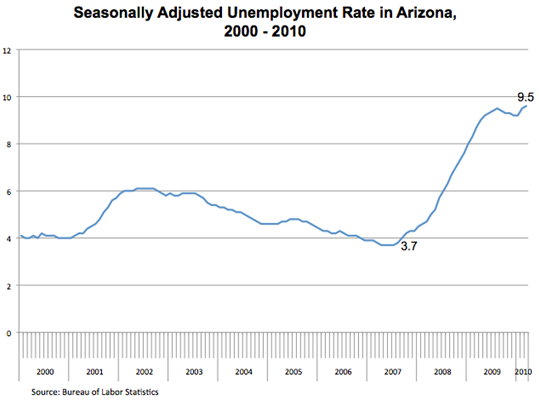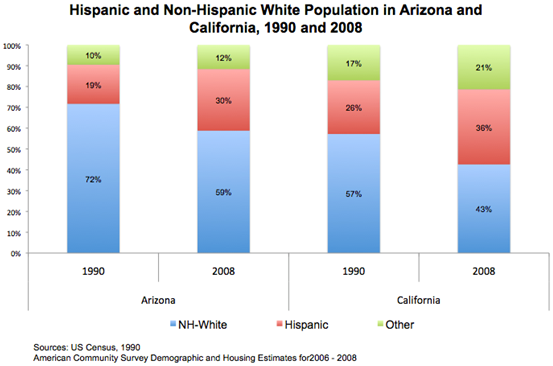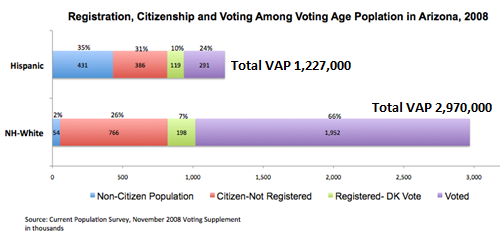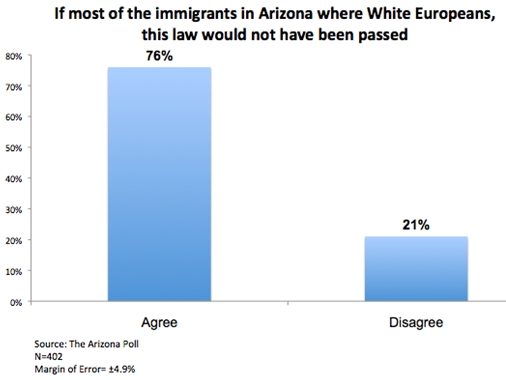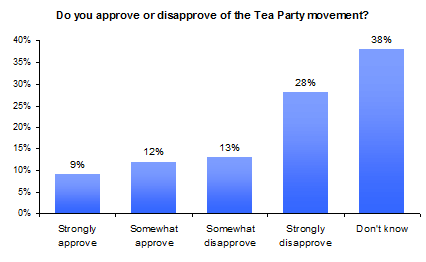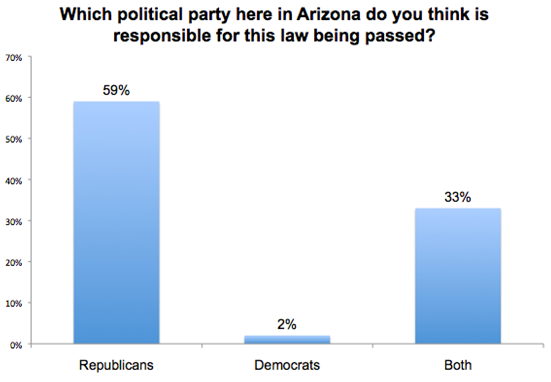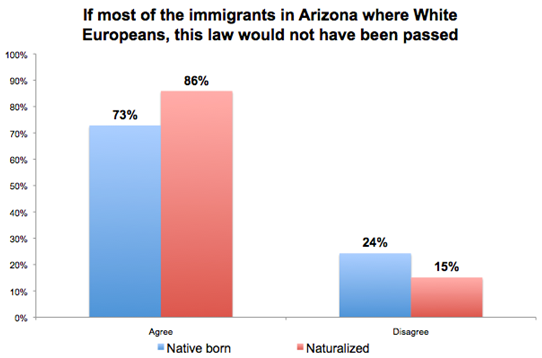In 1994 California passed the anti-immigrant measure Prop 187, strongly endorsed by Republican Governor Pete Wilson, and since then Latino voters have aligned heavily with the Democratic Party in California. Is Arizona next ? ? ?
There has been considerable discussion over Arizona’s passing of SB1070 and its place in this country’s love-hate relationship with immigration, but two other bills in Arizona make today’s populist movement conflate the debate over citizenship status with that of race and ethnicity. Bill HB2281 passed Governor Brewer’s desk with little fanfare banning ethnic studies courses in the state’s public and charter schools. In addition to this, SB1097 is now making its way through the legislature, requiring schools to report to the state the number of undocumented immigrant children in their student population, along with an estimation of the costs associated with educating those children.
This bill is similar to Proposition 187 in California, which passed and helped propel Governor Pete Wilson to electoral victory as he sought a way to win an election on the heels of an economic recession. However, the Proposition 187 debate in 1994 was a watershed affair for Latinos in California. The debate spurred a wide political mobilization among Latinos not seen since the Chicano Movement era of the 1960’s and the Democratic Party has benefited from growing registration numbers among Latinos since then. The use of illegal immigration as a political tactic to mobilize Anglo voters proved to be successful for Republicans in the short term. Wilson rode a national wave of populism in 1994 and the GOP was able to win power in Congress for the first time in two generations, culminating in Newt Gingrich’s “Contract with America”. However, the GOP has not enjoyed the power it once had in California and a slumping national GOP is now searching for a way back into power.
The short-term tactic of mobilizing Anglo voters on the backs of illegal immigrants continues to this day in Arizona. Like Governor Pete Wilson, Governor Jan Brewer is experiencing political difficulties managing the economic restructuring of her state in a deflated economy and needs to find a way to breathe life into her upcoming campaign within the context of a surging populist movement angered by the perception of an irresponsible growth in government. A look at the unemployment rate from the Bureau of Labor Statistics below in Arizona shows that not only has the recession hit the state particularly hard, but quick also, almost tripling in the span of two years. California’s unemployment rate was equally pernicious though longer lasting (for now), hitting a high of 9.8% in March of 1993 and 7.9% when Californians voted in favor of Prop 187 in November of 1994. California’s unemployment rate hovered around 7% for years after the military base closings in 1990.
The demographics of Arizona today resemble that of California in 1990 also. Its difficult to tell how significant this is for the future of Arizona politics without a detailed look at the institutional resources available to Latinos in order to navigate the social, economic and political landscape of the state. However, on its face the demographic trends at least illustrate the potential for significant electoral change. Perhaps this explains, in addition to the other bills, why Arizona has led the nation with a strict voter identification law, which has been shown to disproportionately impact minorities and the poor. Seen within the context of a growing Latino population, Arizona’s institutional response probably makes sense, depending on how you view the world. Add to this the fact that Latinos in Arizona are quite young, averaging twenty-five years old, while the Non-Hispanic white population is in their electoral prime, forty-four years old. Combined with Latino’s higher birthrates, Latinos are simply pushing Non-Hispanic whites out the back door and the institution is fighting back, as hopeless as it is.
Citizenship status remains the greatest structural barrier to participation for Latinos. More than a third of Latinos in Arizona are not citizens, and therefore ineligible to vote. However, even among citizens, Latinos in Arizona lag their Non-Hispanic white counterparts, with only 37% of Latino citizens voting in 2008 and 52% of eligible residents registered to vote. While Latinos make up 14% of those registered to vote in Arizona, they only make up 12% of Arizona’s voters in 2008. If Latinos participated at the same rates as Non-Hispanic whites, they would make up 21% of Arizona’s voters, nearly double. Even more daunting to the system, if non-citizens were given a clear pathway to citizenship and participated at the same rate, they would make up more than 32%of Arizona’s voters. Rolling out the welcome mat to Latinos may result in doubling their participation rates, and favorable citizenship laws could result in tripling the current electoral power of Latinos. Arizonans seem unwilling to do either without a fight.
This is not to say that either political party is in the dark – yet. There are those in the Republican party and conservative pundits who think the GOP should take a different tack. This is a calculation that has gone on since the GOP’s southern strategy sought to capture white angst in the wake of the civil rights movement throughout the South, while sacrificing the vote of African Americans. A similar calculation is being made in the Southwest and throughout as it pertains to Latinos. It seems as though Pete Wilson’s playbook is being replayed. The decision seems to have been made throughout the health care debate to try to capture the mobilized tea party movement, who were initially about small government, low taxes, etc. Right around February, when the health care battle was winding down, the leadership needed a way to keep the Tea Party relevant into the 2010 election. The decision to make Tancredo the keynote speaker in Colorado’s Tea Party convention was a clear signal to the GOP leadership on what they needed to do to maintain the attention and sanction of the Tea Party, to invigorate the Tea Party with a dose of anti-immigrant sentiment (and anti-minority views in general according to new data from Dr. Christopher Parker at the UW).
Within this context, Latino Decisions polled Latino registered voters in Arizona, asking them questions about how they perceived the motivations behind SB1070 and who was to blame for its passing. Our findings suggest that while the electoral math may make sense to Brewer and even national races to ride a wave of populism on the backs of immigrants, the longer-term implications may put Arizona on a pathway similar to California. Following the Prop 187 debate, researchers such as Dr. Ricardo Ramirez and others found that a hostile social environment prompted a rise in political participation among Latinos, including rates of naturalization. A heightened sense of hostility prompted Latinos to get in the game, as it were.
Latino Decisions asked respondents if they felt SB1070 targeted Latinos because of their ethnicity and they overwhelmingly agreed that if most immigrants in Arizona were white Europeans, SB1070 would not have been passed.
However, it’s not clear if Latinos see SB1070 within the context of a populist movement, such as the Tea Party. When asked if they approve or disapprove of the Tea Party movement, twice as many Latino voters disapproved of the Tea Party movement than approved, but 38% of Latino voters did not know if they approved or disapproved of the Tea Party movement.
Perhaps Latino voters are not seeing the wave of anti-immigrant sentiment through the lens of a populist movement, but through party politics. When asked which party was responsible for passing SB1070, almost 60% of Latino voters placed the blame on Republicans. At the same time, Democrats in Arizona have been quick to not stake out a clear position on the issue of immigration. Interestingly, Latino voters were reluctant to blame Democrats outright, though 33% did say both parties were to blame. What’s more, Democrats were seen as not doing enough to prevent SB1070 from passing. More than 66% of Latino voters polled said that Democrats did not do enough to prevent SB1070 from passing.
Perhaps a sign of the future is the difference between native born and naturalized Latino voters in their view of the racial motivation behind SB1070. When the two groups are broken out in the previous question about white Europeans, naturalized Latino voters were more likely to agree with the sentiment that if Arizona’s immigrants were white Europeans, SB1070 would not have passed. There are two ways to look at this, as a generational effect or a cohort effect (albeit a small one). One may argue that the future is not so bleak for the GOP because the sons and daughters of the naturalized voters are less likely to view attacks on Latinos in racial terms. Yet, our poll found that over 80% of Latinos into the fourth generation believed SB1070 would lead to widespread racial profiling against all Latinos. Thus, one may also argue that the attacks on Latino identity could leave a long lasting impact on today’s newest participants that will stay with them and their children for a long time to come. California’s experience suggests the latter.
Stephen A. Nuño, Ph.D., is an Assistant Professor in the Department of Politics and International Affairs at Northern Arizona University, and a collaborator on the May 2010 Latino Decisions Arizona survey

